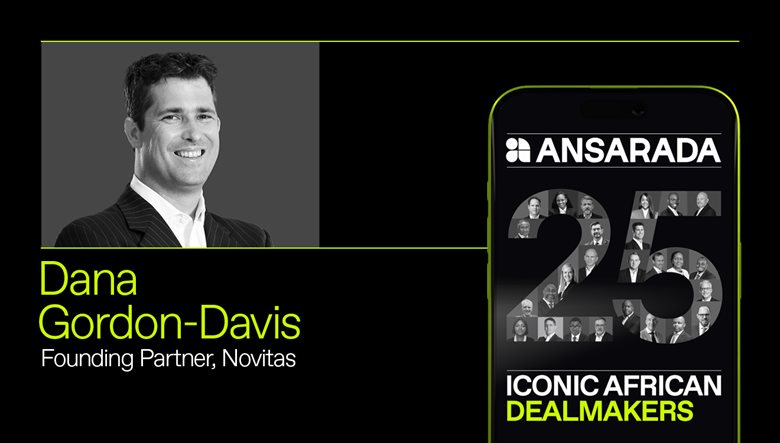Innovating deal-making: Dana Gordon-Davis’s journey through global and South African M&A
Dana is a seasoned corporate financier with 23 years of experience spanning diverse sectors, including financial services, technology, media, manufacturing, logistics, and retail.
By ansaradaMon Apr 14 2025Mergers and acquisitions, Industry news and trends, Innovation

Over his career, Dana has completed over 50 advisory mandates and pioneered an innovative approach to deal structuring called “value sharing,” which prioritizes mutual gain for buyers and sellers. Beyond his deal-making expertise, Dana is an entrepreneur, having launched ventures in digital marketing, corporate finance, internet technologies, and contract mining. In this Q&A, he reflects on his ambitious beginnings, the evolution of deal-making, and the principles that have sustained his career.
Your journey in corporate finance began in 2001 with Credo, a corporate finance firm in London. What initially drew you to the field, and what has kept you passionate about it?
Thank you. My interest in corporate finance began earlier, in 1991. I was staying at a friend’s flat while on holiday and learned he was a corporate financier who owned the entire building. That moment planted the seed. Later, in 2000, I was asked to conduct due diligence for investors, and I found the process fascinating—getting under the hood of a business, learning how it works, and assessing its potential as an investment. That experience ultimately led me to Credo in London, where I immersed myself in understanding businesses, their models, and the factors driving success or failure.You’ve often spoken about “value sharing” in deal structuring. Could you elaborate on this principle and how it has shaped your approach to transactions?
Of course. Early in my career, deal-making often felt like a zero-sum game where one party’s gain was the other’s loss. Negotiations were driven by numbers and egos, with little regard for collaboration. In 2004, I read Getting to Yes, which transformed my perspective. M&A isn’t just about negotiating a price—it’s about creating shareholder value for both the buyer and seller. The concept of value sharing is rooted in the belief that the combined entity can generate more value than the individual businesses could achieve separately. To make this work, both parties need to align on a shared vision. Sellers should participate in the upside potential unlocked by the transaction, incentivising collaboration and increasing the likelihood of achieving a “1+1=3” outcome. This requires creativity and a deep understanding of the business and its value drivers.Can you share an example of a challenging transaction and the lessons you took from it?
One transaction early in my career taught me the importance of preparation. A client insisted we fast-track the process, relying on his knowledge of the business instead of conducting thorough analysis. We initially negotiated a premium price—33 times EBITDA compared to the market norm of 5-7 times. However, during due diligence, we couldn’t substantiate some of the client’s claims, jeopardizing the deal. We had to scramble to complete the necessary analysis under intense pressure to regain the buyer’s trust. The lesson? There are no shortcuts in deal-making. Rigorous preparation is non-negotiable and lays the foundation for a successful transaction.Technology has transformed deal‑making. How has the due diligence process evolved during your career?
When I started, due diligence involved physical data rooms filled with lever arch files. It was cumbersome and inefficient—documents had to be indexed, checked in and out, and accessed in person during business hours. Today, platforms like Ansarada have revolutionized the process. Secure online data rooms allow multiple parties to access documents simultaneously from anywhere in the world, 24/7. Updates are instantaneous, and AI is beginning to provide high-level insights. While technology has streamlined information sharing, the human element—critical thinking and analysis—remains essential.Are there any career-defining transactions that stand out to you?
A few come to mind. In 2006, we sold a fintech company to an Australian-listed buyer for 12 times revenue—a substantial premium. We achieved this by jointly developing a business case with the buyer, pricing the deal based on the future shareholder value it would create. The following year, we sold a Luxembourgbased company for nearly double the market EBITDA multiple. Even during the 2008 financial crisis, we closed a deal at five times revenue, and the buyer recovered its investment within 18 months. These experiences solidified my belief in value sharing as a transformative approach to corporate finance. By aligning buyer and seller interests, we achieved outcomes that exceeded market expectations and left both parties satisfied.What trends have most significantly shaped South Africa’s M&A landscape over the past 25 years?
Globally, the 2008 financial crisis, COVID-19, and increased focus on ESG have reshaped M&A. In South Africa, unique challenges like state capture, load shedding, BBBEE, and employment equity have added complexity. COVID-19 accelerated digital globalisation, while supply chain vulnerabilities have led to reshoring and diversification. South Africa’s regulatory environment and energy shortages remain hurdles, but they also create opportunities for innovative deal-making.What unique challenges and opportunities do South African dealmakers face?
The growing accessibility of global markets is a significant opportunity. International buyers are increasingly interested in South African innovations, often willing to outbid local buyers. However, the challenge lies in identifying and attracting these buyers. Dealmakers must overcome concerns about South Africa’s BBBEE structures, corruption, and energy shortages, which can deter international investors. Building trust and navigating these complexities require creativity, persistence, and a global network.What advice would you give to young professionals aspiring to succeed in corporate finance?
Integrity and preparation are key. Be rigorous in your analysis, adaptable to new information, and confident in your abilities once you’ve done the work. Don’t hesitate to seek guidance, but ultimately, trust in your judgment. Corporate finance is a relationship-driven field. Trust and integrity are the foundation of long-term success, so always prioritize these values.Discover the stories behind Africa's most iconic dealmakers
Gain exclusive insights from 25 of the continent’s top M&A leaders, including Andrew Brooking, as they share their experiences, strategies, and lessons learned over the past 25 years.
Download the report